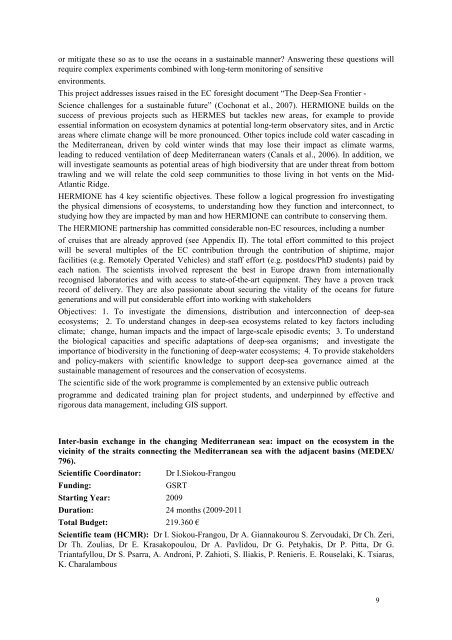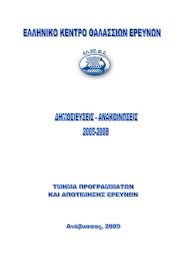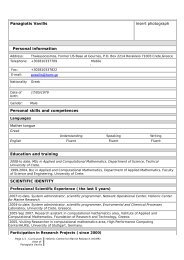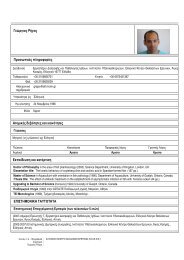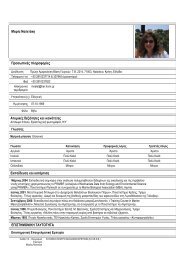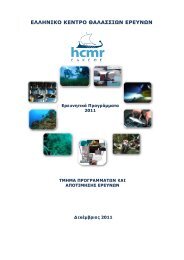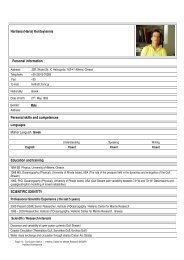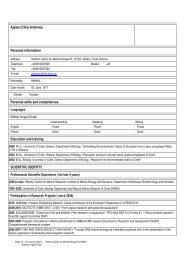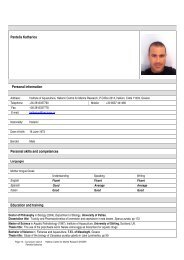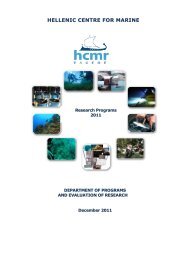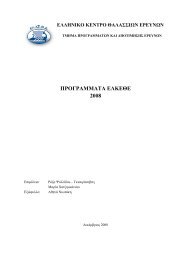2009 Research Programmes of the HCMR - Hellenic Centre for ...
2009 Research Programmes of the HCMR - Hellenic Centre for ...
2009 Research Programmes of the HCMR - Hellenic Centre for ...
Create successful ePaper yourself
Turn your PDF publications into a flip-book with our unique Google optimized e-Paper software.
or mitigate <strong>the</strong>se so as to use <strong>the</strong> oceans in a sustainable manner? Answering <strong>the</strong>se questions will<br />
require complex experiments combined with long-term monitoring <strong>of</strong> sensitive<br />
environments.<br />
This project addresses issues raised in <strong>the</strong> EC <strong>for</strong>esight document “The Deep-Sea Frontier -<br />
Science challenges <strong>for</strong> a sustainable future” (Cochonat et al., 2007). HERMIONE builds on <strong>the</strong><br />
success <strong>of</strong> previous projects such as HERMES but tackles new areas, <strong>for</strong> example to provide<br />
essential in<strong>for</strong>mation on ecosystem dynamics at potential long-term observatory sites, and in Arctic<br />
areas where climate change will be more pronounced. O<strong>the</strong>r topics include cold water cascading in<br />
<strong>the</strong> Mediterranean, driven by cold winter winds that may lose <strong>the</strong>ir impact as climate warms,<br />
leading to reduced ventilation <strong>of</strong> deep Mediterranean waters (Canals et al., 2006). In addition, we<br />
will investigate seamounts as potential areas <strong>of</strong> high biodiversity that are under threat from bottom<br />
trawling and we will relate <strong>the</strong> cold seep communities to those living in hot vents on <strong>the</strong> Mid-<br />
Atlantic Ridge.<br />
HERMIONE has 4 key scientific objectives. These follow a logical progression fro investigating<br />
<strong>the</strong> physical dimensions <strong>of</strong> ecosystems, to understanding how <strong>the</strong>y function and interconnect, to<br />
studying how <strong>the</strong>y are impacted by man and how HERMIONE can contribute to conserving <strong>the</strong>m.<br />
The HERMIONE partnership has committed considerable non-EC resources, including a number<br />
<strong>of</strong> cruises that are already approved (see Appendix II). The total ef<strong>for</strong>t committed to this project<br />
will be several multiples <strong>of</strong> <strong>the</strong> EC contribution through <strong>the</strong> contribution <strong>of</strong> shiptime, major<br />
facilities (e.g. Remotely Operated Vehicles) and staff ef<strong>for</strong>t (e.g. postdocs/PhD students) paid by<br />
each nation. The scientists involved represent <strong>the</strong> best in Europe drawn from internationally<br />
recognised laboratories and with access to state-<strong>of</strong>-<strong>the</strong>-art equipment. They have a proven track<br />
record <strong>of</strong> delivery. They are also passionate about securing <strong>the</strong> vitality <strong>of</strong> <strong>the</strong> oceans <strong>for</strong> future<br />
generations and will put considerable ef<strong>for</strong>t into working with stakeholders<br />
Objectives: 1. To investigate <strong>the</strong> dimensions, distribution and interconnection <strong>of</strong> deep-sea<br />
ecosystems; 2. To understand changes in deep-sea ecosystems related to key factors including<br />
climate; change, human impacts and <strong>the</strong> impact <strong>of</strong> large-scale episodic events; 3. To understand<br />
<strong>the</strong> biological capacities and specific adaptations <strong>of</strong> deep-sea organisms; and investigate <strong>the</strong><br />
importance <strong>of</strong> biodiversity in <strong>the</strong> functioning <strong>of</strong> deep-water ecosystems; 4. To provide stakeholders<br />
and policy-makers with scientific knowledge to support deep-sea governance aimed at <strong>the</strong><br />
sustainable management <strong>of</strong> resources and <strong>the</strong> conservation <strong>of</strong> ecosystems.<br />
The scientific side <strong>of</strong> <strong>the</strong> work programme is complemented by an extensive public outreach<br />
programme and dedicated training plan <strong>for</strong> project students, and underpinned by effective and<br />
rigorous data management, including GIS support.<br />
Inter-basin exchange in <strong>the</strong> changing Mediterranean sea: impact on <strong>the</strong> ecosystem in <strong>the</strong><br />
vicinity <strong>of</strong> <strong>the</strong> straits connecting <strong>the</strong> Mediterranean sea with <strong>the</strong> adjacent basins (MEDEX/<br />
796).<br />
Scientific Coordinator:<br />
Funding:<br />
Dr I.Siokou-Frangou<br />
GSRT<br />
Starting Year: <strong>2009</strong><br />
Duration: 24 months (<strong>2009</strong>-2011<br />
Total Budget: 219.360 €<br />
Scientific team (ΗCMR): Dr I. Siokou-Frangou, Dr A. Giannakourou S. Zervoudaki, Dr Ch. Zeri,<br />
Dr Th. Zoulias, Dr E. Krasakopoulou, Dr A. Pavlidou, Dr G. Petyhakis, Dr P. Pitta, Dr G.<br />
Triantafyllou, Dr S. Psarra, A. Androni, P. Zahioti, S. Iliakis, P. Renieris. E. Rouselaki, K. Tsiaras,<br />
K. Charalambous<br />
9


